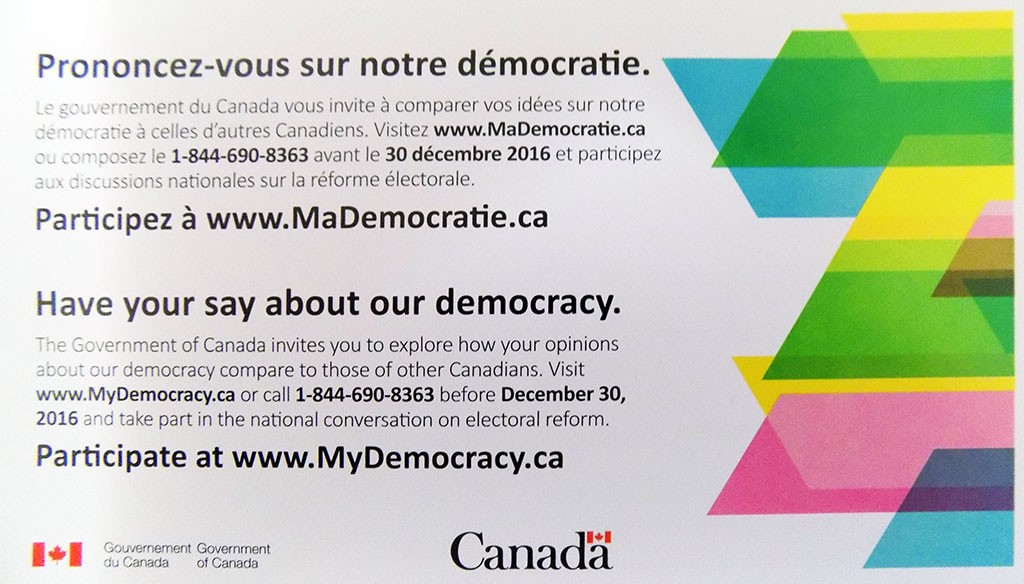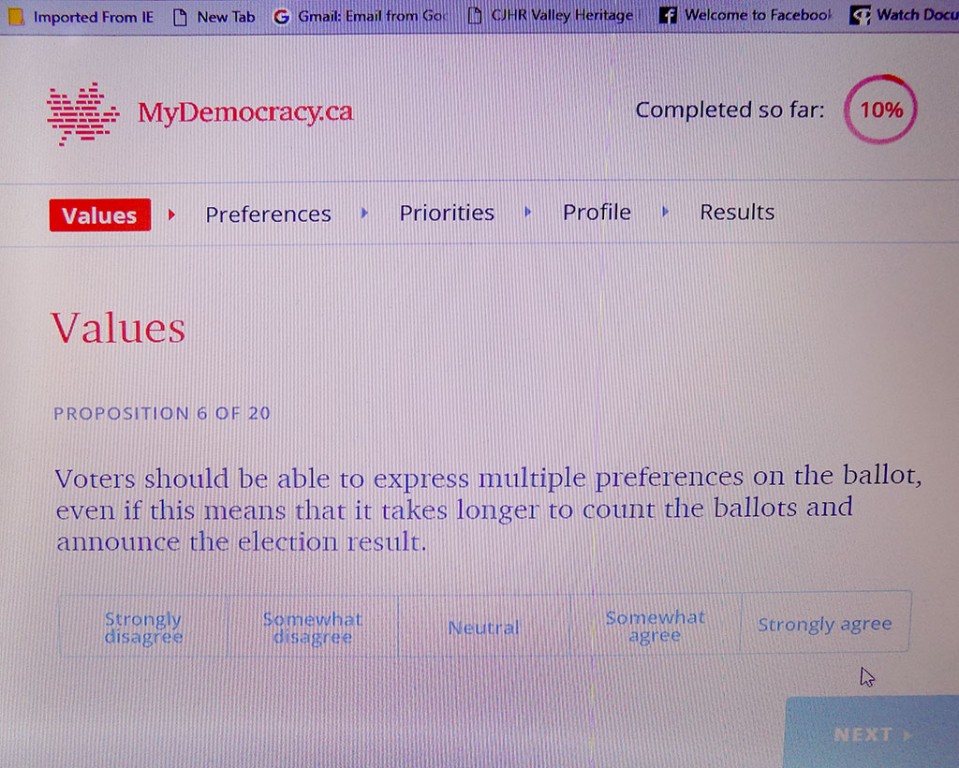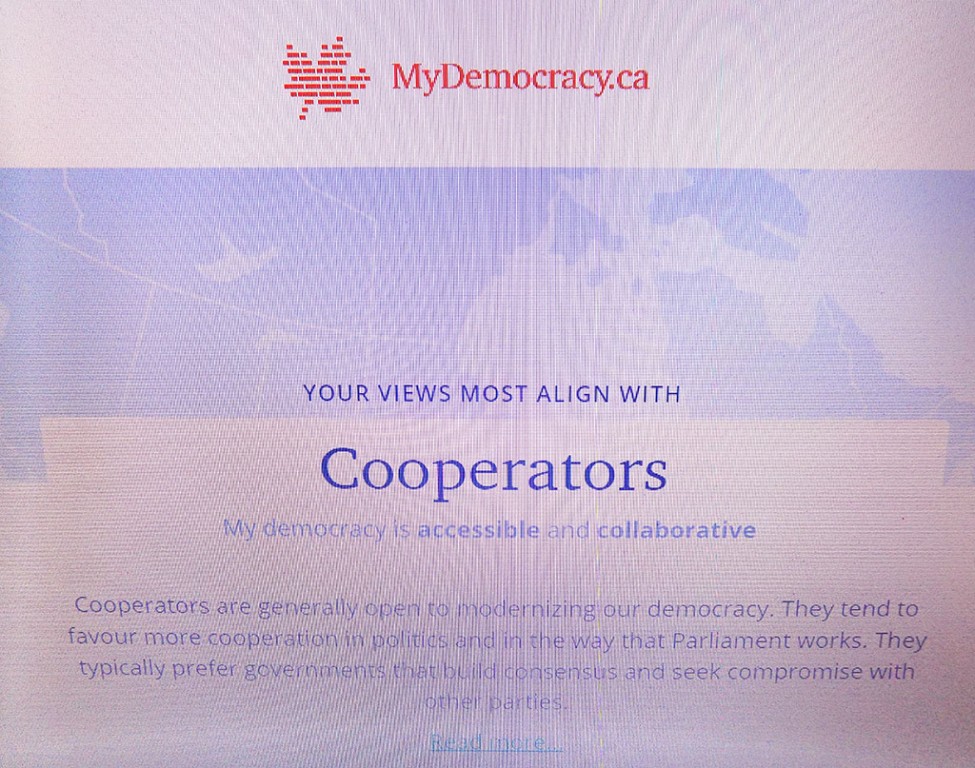Canada considers federal electoral reform

Postcards urging citizens to complete the electoral reform survey recently showed up in Canadian mailboxes. Photo: James Morgan
While the controversy continues in the United States over electoral votes versus the popular vote, Canadians have been dealing with their own controversy over how their government is elected. In the 2015 election campaign, Justin Trudeau said that election would be the last where Members of Parliament (MP) were elected based on which candidate gets the highest number of votes and the party that elects the most MP’s forms the government.
Now, just over a year later after winning the 2015 election, Prime Minister Trudeau’s Liberal government is looking at possible new voting systems.
Looking for a new way
One option is allocating the seats in the House of Commons based on percentage of the popular vote parties receive. Another idea is a blend of popular vote and the existing system, which would lead to multi-member districts. And the third option is having MP’s selected by voters ranking their ballots in order of preference.
National elections in Canada are federally managed by Elections Canada, a non-partisan agency. Canadians vote with paper ballots that list the names of candidates and parties. Voters mark an “X” beside their candidate of choice. The ballots all go in boxes and are counted by hand once the polls close on election night. The process goes remarkably fast and the unofficial results start showing up quickly. It’s amazing considering the old-fashioned approach and vast geography of the country.
The federal government has had a rough time managing the electoral reform file. A committee of MPs recently studied the idea. Maryam Monsef, the Minister of Democratic Institutions, criticized the committee for not doing enough—a move that’s considered disrespectful and unparliamentary. She later apologized. Monsef has also hinted the Trudeau government already has a preferred choice, leaving the opposition parties accusing the government of only pretending to listen to citizens through consultation. Conservative MPs have called for a national referendum on electoral reform, but the Liberals don’t want one.
Federal consultation with Canadians has instead been through an online survey at the website www.MyDemocracy.ca The survey asks citizens multiple choice questions such as if they feel political parties should have to cooperate with each other more to create legislation. However, I noticed that some of the questions were repetitive. They seemed framed to favor the preferential/ranked ballot idea and online voting. Another question asked if election day should be a federal holiday.
At the end of the survey, each respondent is assigned a category they fit into. Apparently, I’m a “Cooperator” and want democracy that is “accessible and collaborative.”
Rating the reform process
Opposition politicians and electoral reform activists have widely panned the survey. Conservative MP Scott Reid likened it to “a dating website designed by Fidel Castro.” An MP in the New Democratic Party said it was possible to complete the survey more than once. Fair Vote Canada is an organization dedicated to electoral reform and is made up of people from all political parties. Julien Lamarche, President of the National Capital Region chapter said the focus should be on adopting some form of proportional representation. He said the survey unfairly asks citizens if their neighbors should have equal political power to themselves. Lamarche added he thinks the Trudeau government is already “somewhat decided” on what it plans to do with electoral reform. That decision will be made public sometime in the year ahead.
Tags: canada, electoral reform, politics










This is my highest priority for this government. Select an existing system for a country similarly organised as Canada and assuming it has no glaring problems run with it. Do not have a referendum since no change will be approved by a voting public who do not wish to seek an understanding but would rather listen to the hype of those who oppose it. The Liberals should be willing to use much of their political capital to get Proportional Representation passed for Canada.
If the big majority of people who write Canadian (or British) media articles – like this one – were directed to reform the electoral system, they, as well as the politicians, experts, parties, pressure groups, and general public would get it wrong. The present democratic decision for electoral reform is undemocratic.
The inventors of proportional representation, over 150 years ago, did, however, know what they were doing. The Danish mathematician and statesman Carl Andrae and independently the English barrister Thomas Hare knew that a proportional count must be of a preference vote or ranked choice.
The ignoramuses of the modern world make a false dichotomy of ranked ballots and proportional representation (in the narrow partisan way they see it).
PR (by definition) must be in multi-member constituencies electing multiple candidates on an equal share of the votes. That means that voters must have a multiple choice vote, ranking them in order of popularity (1,2,3, etc). This is why John Stuart Mill, the greatest philosopher of science in the 19th century, called “Mr Hare’s system” Personal Representation, as well as Proportional Representation.
The Hare system, which he called the Single Transferable Vote was used in the Canadian Progressive era in 4 cities provincial elections for 30 years. STV survived in 3 cities municipal elections for 50 years.
Our Reactionary or anti-democratic era has conveniently forgotten this.
When the BC Citizens Assembly innocently rediscovered that STV is the best system on the planet, the provincial parties, between them, ruthlessly suppressed its re-implementation. (Vancouver used STV in municipal elections some 50 years.)
But you needn’t think Canada is uniquely oafish. Britain has an even more hair-raising record. As far back as 1918, HG Wells said, about this suppression of STV: “British political life resists cleansing with all the vigour of a dirty little boy.” And that was only the first sentence of his condemnation. (In the fourth year.)
Richard Lung.
Website: Democracy Science; with links to 3 free e-books on election method: Peace-making Power-sharing; Scientific Method of Elections; Science is Ethics as Electics.